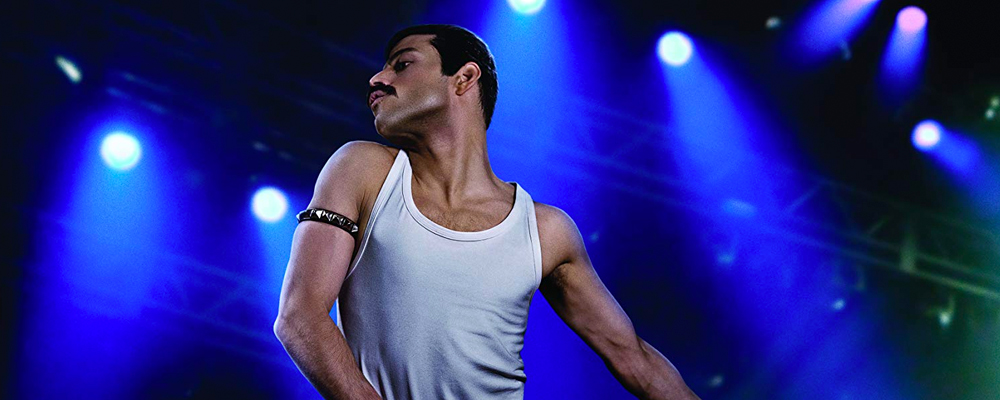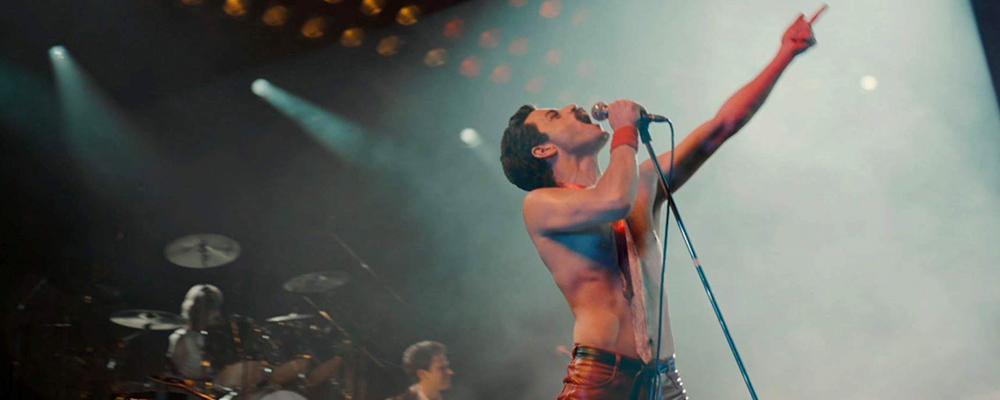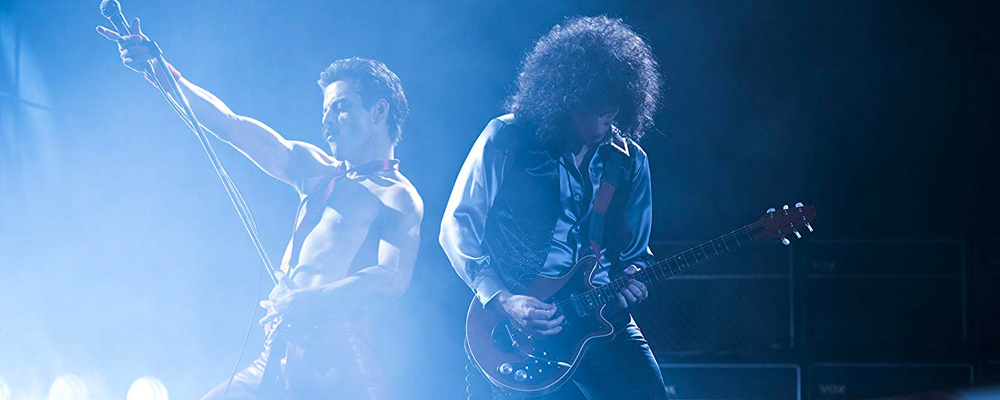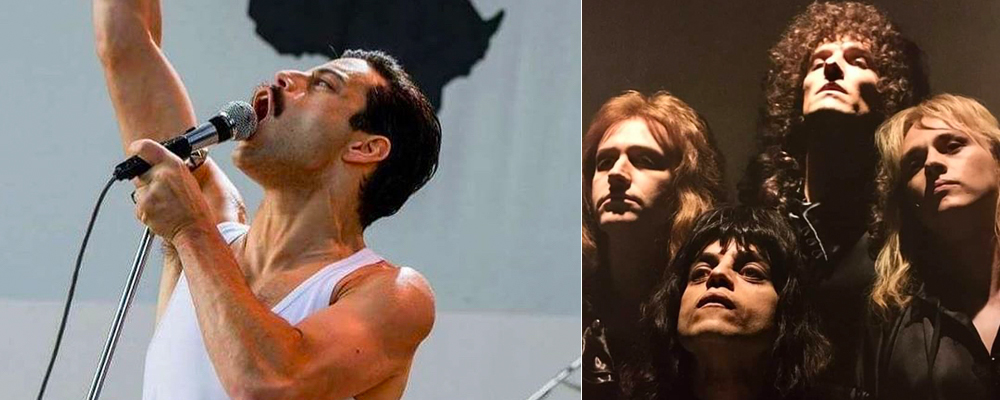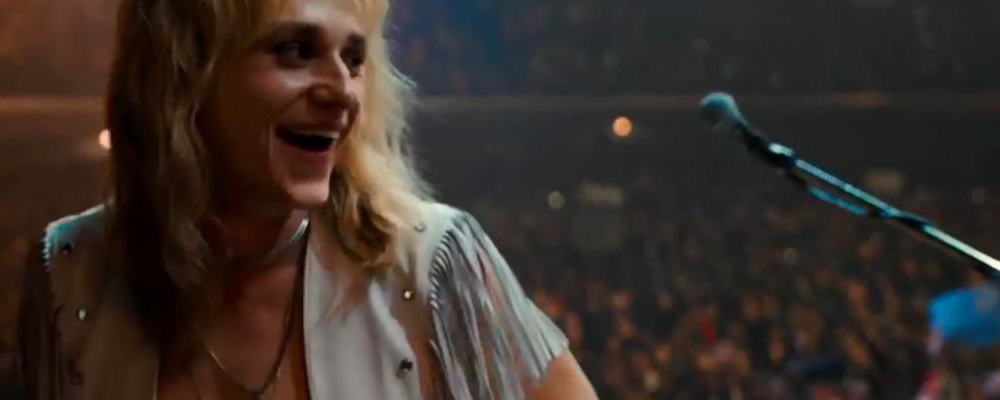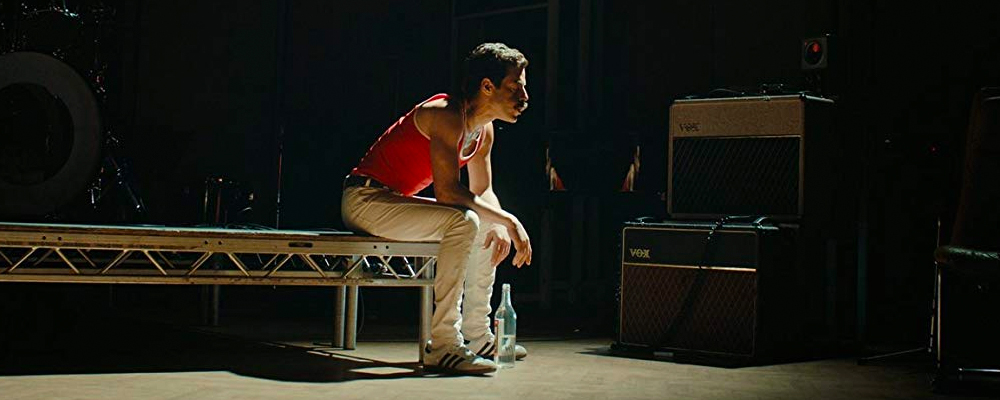Rami Malek Rocks Hard as Freddie Mercury in ‘Bohemian Rhapsody’
Alci Rengifo
“Bohemian Rhapsody” shows a lot yet says so little. The highlight of this great-looking yet hot-aired film is Rami Malek, who channels legendary Queen frontman Freddie Mercury with dynamic gusto. Queen’s anthems, ballads and performances are firmly set in the Olympic heights of rock n’ roll myth, so the least an epic about Mercury and the band can offer are actual insights into who they were, what drove them, or where the songs came from. Director Bryan Singer gets sole credit, but in reality there were two at the helm. Singer was fired near the end of production and was replaced by Dexter Fletcher. It’s hard to tell who shot what, but the final product overall feels like a distant look at Queen, with much dramatizing of what we already know, while keeping away what we don’t.
It’s 1970s London and a young Farrokh Bulsara (Malek), who goes by Freddie Mercury, works his days lugging luggage at Heathrow Airport. At night he checks out the local club scene and comes across a band with a decent sound in need of better vocals. He meets backstage with drummer Roger Taylor (Ben Hardy) and guitarist Brian May (Gwilym Lee), hinting that his extra incisors give him quite the vocal range. A bit skeptical at first, the guys take on Freddie and we then cut to the band, now Queen and with bassist John Deacon (Joseph Mazzello), doing small tours and getting signed. With wealth and fame comes more ambition and Freddie, now established as a dynamic performer, pushes the band to record grandiose musical experiments combining rock with operatic flourishes. Thus, their legendary cut, “Bohemian Rhapsody,” is born. But as the band’s star rises, Freddie is soon surrounded by bad influences like Paul Prenter (Allen Leech), who tries to convince him to go solo. But just as forces and egos threaten to break Queen apart, the music and their bond keep bringing them back together.
The production of “Bohemian Rhapsody” had such a rocky start that it’s almost no surprise the final product is a bit uneven. There was a fired director, a last minute replacement, and before all that the original star, Sacha Baron Cohen, left the role of Mercury which was then filled by Malek. In the end it almost doesn’t matter which scenes were directed by whom, with a PG-13 rating what we get is a film that feels like a conveniently romanticized take on Queen. Like last year’s Tupac Shakur biopic “All Eyez on Me,” a lot of “Bohemian Rhapsody” feels like a parade of the band’s most famous moments, with few insights into their private lives or even their creative process. Even the editing hurtles forward. One moment it’s three penniless guys meeting behind a club and then bam, they’re a hit. We never see the real struggles for reaching success. The screenplay by Anthony McCarten, who wrote last year’s great “Darkest Hour,” feels suspiciously like something written with the surviving band members looking over his shoulder. For an 80s band known for its partying ways, the Queen of this movie wouldn’t cut it even in Ancient Rome. Mercury is shown parading around in a leather suit, taking a drink from a dwarf, but nothing too extreme even for Hollywood Blvd. on Halloween. The other band members, per this movie, apparently never partied at all and lived like instrument-playing monks. Other scenes suffer from an odd inauthenticity in the dialogue. Mercury rarely talks like a human being, instead he looks upward and says things like “I will be what I was born to be” or “we will touch the sky!”
Missing here is the raw biography of films like “The Doors, “The Rose,” or “Ray,” where the audience gets to know the artist as a flesh and blood, flawed or passionate human expressing him or herself through their craft. In “Bohemian Rhapsody” the music simply comes out of nowhere. One day a band member wants a clap along jam, so they just whip together “We Will Rock You” in one short scene. The title song gets the most exposure as we see in a good and funny scene how Mercury tries to convince everyone, including the label head that opera and rock can go pretty well. The recording session is shown in detail, with some nice details like coins on Taylor’s drum kit to get a specific sound. But to know how classics like “Crazy Little Thing Called Love,” “Somebody to Love” or “Killer Queen” came to be or were inspired will require going online or getting a book.
The film also hints at Mercury’s dual conflicts with his family, first involving his apparent shame over his Zoroastrian roots and then his sexuality. But first we merely get a goofy dinner scene where Mercury announces he has legally changed his name, and later, near the end, he brings a boyfriend home and holds his hand in front of his traditional parents. Another fumbled angle involves his marriage to Mary Austin (Lucy Boynton), who Mercury falls in love with in his pre-fame days. Boynton is simply used to pop in once in a while and remind audiences that Mercury is bisexual. When he confesses this truth she admits she can’t stay married, but he will still try to keep her as an obsession (when she marries again and gets pregnant he gasps, “how could you?!”). What the deeper dynamics and struggles of this relationship were are never properly explored. The film’s third act, where Mercury deals with his inflated ego, the leeching by Paul Brenter and his eventual AIDS diagnosis is the strongest because finally, all the Queen promo video feel moves aside for the human dimensions of this life.
“Bohemian Rhapsody” is most enjoyable during its grand concert scenes where Malek does an uncanny job capturing the style and mannerisms of the great vocalist. The raw energy, burning charisma and general likeability of Mercury come across brilliantly. The final concert sequence at the legendary 1985 Live Aid show is where Malek brings it home, evoking Mercury’s strut without missing a beat. If the script is weak, this performance still establishes Malek a great new talent. Having achieved renown with the show “Mr. Robot,” now Malek proves he can take on big roles. He was also the best thing in the recent “Papillon” remake. Decked with the famous Mercury overbite, he plays the rock god as a man with talent and ego to spare.
“Bohemian Rhapsody” delivers exhilarating concert moments and songs that are never played out. It features a lead actor successfully evoking an icon. But what this film needed, ironically enough, was to be a bit more iconoclastic. We already know the songs, we already know the concerts were amazing, what we yearn for is a real backstage pass.
“Bohemian Rhapsody” opens Nov. 2 in theaters nationwide.

